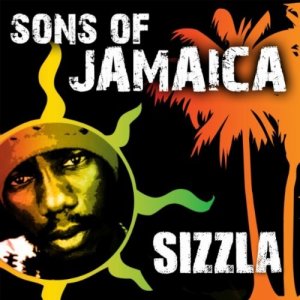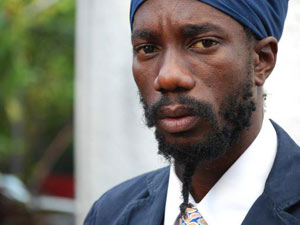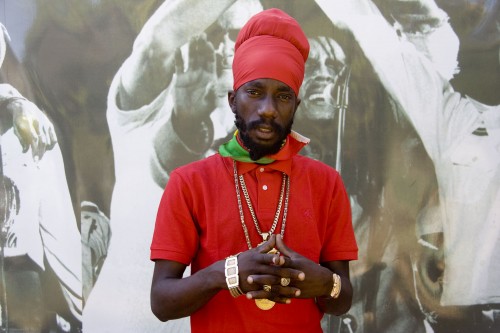NOT BOB MARLEY’S FAULT. Can’t blame him. Can’t blame a once in a generation artist. A man who turned skeptics into believers, turned a marginal sound into a popular one, temporarily turned war into peace. He had dreadlocks and praised Haile Selassie I. Was odd to folks originally. He turned odd into the norm, odd into cool, odd into a voice for disaffected people around the globe. Wore tight denim shirts and jeans better than anyone too. He was big. Too big for a genre he used as a platform for protest. Too big for the country from which the music had been born; too big for the artists that would follow him. A shame.
Sizzla Kalonji didn’t stand a chance really. He’s the good, the bad and the ugly of contemporary Jamaican music. A menacing presence, like hollow voices in a projects’ stairwell in the middle of the night, audacious and unpredictable like Ray Leonard’s bolo punch against Hagler, the sinister theatre of Walken in Things to do in Denver When You’re Dead.
Few people, outside of hardcore Reggae fans, know much about Sizzla. A quick scan of the ‘net reveals little about the man who turns 37 this week, an age Marley only just failed to reach. There are no decent articles to be found. You will not see him on the pop charts or on the front page of the iTunes store. No surprise then that the recent Grammys again ignored Sizzla. Like most mainstream media, the Grammys acknowledge only three things about post-Marley-death Reggae:
-
Relatives or former band members of Marley or artists from his era, the seventies. Let’s call it “Nostalgic Mind Enslavement (NME).”
-
Cheeky island idlers or the type of stereotypical studs that women holidaying in the Caribbean want to have a fling with. Call it a “Taste of Paradise.”
-
The gay-bashing, nihilistic, misogynist. Will simply refer to this one as “Yardie” as this term tends to encompass everything bad about Jamaica.
Some of the story, not all.
Sizzla, a member of the Bobo Shanti branch of Rastafari, rose as dancehall was dying. Dancehall boomed in late-seventies/early-eighties Jamaica, during a period of intense political violence, high unemployment, cuts to public services and crack. A genre preoccupied with slackness, guns, fashion and any topic that enabled locals to forget the daily grind, to help them dance, drink Red Stripe, lick-a-shot in the air. The music was hard as hell. Had to be. Times were tough. “Treacly R&B” wouldn’t wash. Couldn’t wash away the acid of the everyday struggle. By the early Nineties, the world and the mainstream media got to hear it. Liked it. Well, liked the taste of paradise bit. Not so much the ghetto culture from which it grew.
While the media were Reggae bashing, roots had re-emerged in the dancehalls, led by haunting vocalist Garnet Silk in 1992. Buju Banton and Capleton converted to Rastafari, and created the blueprint for the Roots and Dancehall (R&D) sound, which combined the sweet sounding militancy of seventies Roots with Dancehall’s inventive but uncompromising ethos. Sing-jaying (singing mixed with deejaying, the Jamaican term for emceeing/rapping) also came back to the fore. Reggae entered another golden period. The music at that time represented the perfect blend of old and new. Brown Sugar D’Angelo, Paid in Full Rakim. No one did it better than Sizzla.
In 1997, Sizzla released two classic albums in one month, Black Woman and Child and Praise Ye Jah, both featuring radical but lucid criticisms of western society over shimmering slices of traditional, digital and soulful roots rhythms. His music put a mirror right in front of my face. Questioned. When did you start questioning rappers and stop scrutinizing those that write their checks? When did you start thinking that questioning was enough, and that acting was for others? Do you exploit blackness to satisfy your ruthless passions with women? How can you feel so angry watching Leticia getting fucked by Hank but also be turned-on watching Halle sleep with Billy Bob? When did you start being more concerned about what you might lose materially than what you might gain spiritually? Are you searching for yourself through the eyes of your oppressors?
 Made me uncomfortable. Embarrassed. Slowly his music eased me into a place where I started listening again, questioning again, learning again. Took me back to a time when I was “least conservative in my thinking.” Liberating. Restrictive.
Made me uncomfortable. Embarrassed. Slowly his music eased me into a place where I started listening again, questioning again, learning again. Took me back to a time when I was “least conservative in my thinking.” Liberating. Restrictive.
Sounding like a fan, right? Journalism rule number 4080, don’t become fan.
Wasn’t just me though. I worked as a citizenship teacher in prison for a time and listened to my students tell me how much they needed Sizzla’s music for relief. Freedom, they said. Worked in a youth club in West London too. Was nicknamed “Little Vietnam” by locals. Watched rude boys take a pause from profanity riddled Grime to listen to Sizzla’s love songs. Even my heart cries, but who cares. Relief. No need to front anymore, son.
Unlike Buju and Capleton, Sizzla had not used “slack” lyrics to gain notoriety. His choruses sounded more New Wave than Dancehall. Like Coltrane, Sizzla’s music nibbled its way to your soul at times when you least expected it. Made politics cool too. His messages were not concealed beneath sacred chants and facial hair. Made Biblical references and street language a natural blend. Took sing-jaying to its apex. His lyrics were unrelentingly curious, intuitive, noble, assured. Rage at its most eloquent. Black Woman & Child should have been a Catch-a-Fire moment, a Usain-Bolt-in-Beijing moment. Didn’t happen.
Suddenly Sizzla changed. Not quite a Chappelle move, but similar. He allegedly refused to sign to a major label and for many years snubbed interview requests. Then, when on the verge of chart success, he turned down the opportunity to record a video for “Rain Showers.” It had been Sizzla’s most commercial release, a track which saw him freestyle chatting over a rapid but tender Hip-Hop rhythm. Could have been a breakthrough hit, a track that opened the door to his more credible work. Didn’t happen.
Sizzla would go on to study architecture and build a commune called Judgment Yard, which has for years been embroiled in conflict with locals. His politics became erratic, more hatred, less love. Sizzla’s sing-jaying became shakier too, with unhinged, angry roars offset by quirky, toneless Curtis Mayfield wails. Some good, some bad.
Sizzla would go on to be banned across Europe and Canada for homophobic lyrics, perform at Robert Mugabe’s 86th birthday celebration (a man he refused to condemn or condone) and he almost died after he had been hit by a bus while riding his motorcycle.
No one knows what changed. Did he peak too swiftly, power and ego clouding his beliefs? Perhaps it was the pressure to conform to the needs of Dancehall’s hardcore audience, which thirsts for “bad man” lyrics. Maybe Capleton, who changed direction in the late Nineties and adopted a near-maniacal, punk-like flow, had influenced him. It may have been Luciano’s departure from “Fatis” Burrell’s Xterminator Records (Sizzla’s label), which caused the transformation. Luciano apparently cited ideological differences with Sizzla as his reason for leaving Xterminator. “A conflict of interest,” Luciano told Vibe magazine at the time, as he objected to Sizzla’s increasingly antagonistic lyrics. Perhaps, as Geoff Dyer, I believe, once said of DH Lawrence, it’s difficult to put a lid on genius.
Amid the controversy, there have been moments of brilliance. While displaying Fela/Tupac-like energy for creating music (releasing over 80 albums, including close to 40 original studio sets since 1995), he has experimented more than any Jamaican artist. Used everything from Afrobeats, gothic rock and jazz to drum and bass, funk and Lionel Richie soul. Inhabited every genre he employed. His 2002 release Da Real Thing may be the greatest R&D album of all time while 2005’s Soul Deep was a better vocal performance away from being a classic too. Could have, should have walked away with half-a-dozen Grammy’s. He has also found time to cover Dylan’s”Subterranean Homesick Blues,” set up an agro-business and recording studio on farmland in Zimbabwe and establish the Sizzla Youth Foundation.
More than anything, Sizzla’s switch told us that he was not going to be what we wanted him to be. Originally he was, for many, the braver part of us, the articulator of our frustrations, a fantasy in which we could rebel without sacrifice. Gave us a taste, and then told us to make the change ourselves. Listening is not enough, and dependency is a bigger sin.
 Raised another question: Do you no longer follow someone who has given you so much because you no longer believe in or have lost faith in some of his or her politics? If you accept unconditionally, what does this say about you? If you neglect, what does that say?
Raised another question: Do you no longer follow someone who has given you so much because you no longer believe in or have lost faith in some of his or her politics? If you accept unconditionally, what does this say about you? If you neglect, what does that say?
While Sizzla’s politics have made it easy for the mainstream media to marginalize him, he remains true to his Jamaican audience. He music is rooted in, representative of and perhaps trapped by his community, a gift and a curse. Sizzla fans, those that followed him from the beginning, have forgiven his post-’99 actions. Later fans often say, “Well, Bob wouldn’t have done or said that. A shame.”
Like Marley, however, Sizzla is fighting history or those that write history. He is attempting to make the insurmountable achievable. Perhaps, to the wider world, Sizzla’s music comes from a different spiritual place than Marley. I’d disagree. Neither is easily boxed. Both artists have proven that Reggae can transform into anything it damn well pleases. Sizzla is perhaps less willing to pander to the mainstream media than Marley. He is less focused on his global responsibility than Marley. However, the main difference between the two may be that Marley was too big for the media to believe that Jamaica had actually produced a more gifted artist.
Essential Sizzla Mix Tape




Genuinely excellent piece. Thank you. Downloading now.